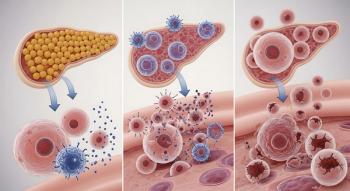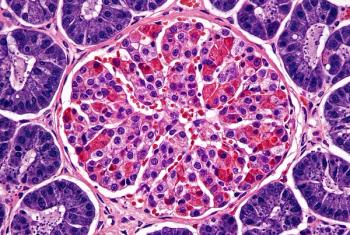
People with Celiac and Thyroid Disease at Higher Risk for Developing Type 1 Diabetes
The findings of a new study lend support for type 1 diabetes autoantibody screening in people with other autoimmune conditions to prevent complications such as diabetic ketoacidosis.
People with celiac disease, hyperthyroidism or hypothyroidism have a three-fold increase in the risk of developing type 1 diabetes, according to a
Researchers, led by Steve V. Edelman, M.D., an endocrinologist and professor of medicine at UC San Diego Health, wanted to investigate the link between type 1 diabetes (T1D) and the presence of other autoimmune conditions. Specifically, they wanted to determine whether people with celiac disease, hyperthyroidism, or hypothyroidism have an elevated risk of developing type 1 diabetes.
Type 1 diabetes is characterized by autoimmune destruction of pancreatic beta cells, leading to insulin deficiency. It often coexists with other autoimmune disorders.
For example, celiac disease and type 1 diabetes are both linked to
The analysis published in Diabetes, Obesity and Metabolism was a retrospective, observational study. Researchers used the Optum Clinformatics claims database for claims from Jan. 1, 2017, to Sept. 30, 2023. The Optum Clinformatics database contains real-world data in the form of health claims for approximately 17 million to 19 million members of large commercial and Medicare Advantage health plans, as well as data from claims submitted for medical and pharmacy healthcare services.
Included in this analysis were patients with a diagnosis of celiac disease (47,099), hyperthyroidism (164,830) and hypothyroidism (980,477) and an equal number of matched controls.
Researchers found that the risk of developing type 1 diabetes was significantly higher in people with these conditions compared with matched controls. The increased risk was observed in both children and adults, and even in people without a family history of type 1 diabetes. In total, 0.14% of those with celiac disease developed type 1 diabetes compared with 0.06% of controls. Similarly, 0.17% of those with hyperthyroidism developed type 1 diabetes compared with 0.06% of controls. In the hypothyroidism cohort, 0.18% of participants developed type 1 diabetes compared with 0.08% of controls.
Subgroup and sensitivity analyses generally supported the main findings, although the risk associated with newly diagnosed hypothyroidism was lower. A secondary analysis that defined type 1 diabetes using both diagnosis and insulin use showed a higher risk in those with celiac disease and hyperthyroidism, but not with hypothyroidism.
The findings align with existing literature that indicates a genetic and immunological link between autoimmune diseases. More than half of new type 1 diabetes cases occur in adults, highlighting the relevance of screening beyond childhood.
Early detection of type 1 diabetes through autoantibody screening — particularly in people with other autoimmune conditions — could prevent complications such as diabetic ketoacidosis, a serious complication of diabetes. Without enough insulin, cells are not able to use sugar for energy. The liver will begin to break down fat for fuel, which produces acids called ketones.
Researchers said the limitations of the study include reliance on ICD-10-CM codes, potential misclassification of diagnoses, incomplete medical histories due to insurance data gaps, and a relatively short follow-up period. Additionally, the autoimmune origin of thyroid conditions in the dataset could not be specifically confirmed. Despite these constraints, the study provides evidence that supports routine screening for type 1 autoantibodies in individuals with coexisting autoimmune diseases, regardless of age or family history.
Newsletter
Get the latest industry news, event updates, and more from Managed healthcare Executive.























